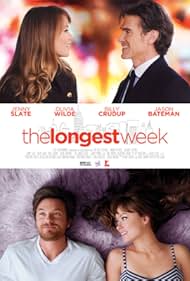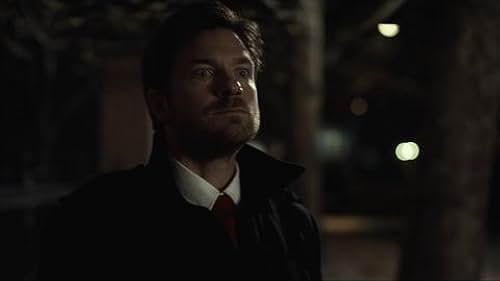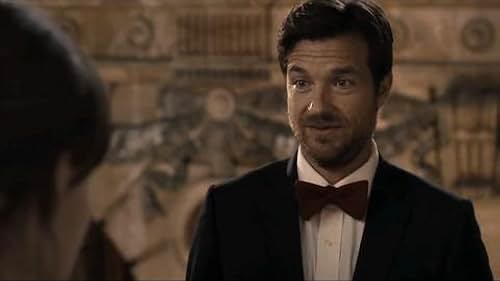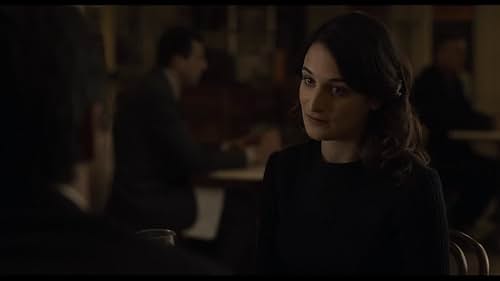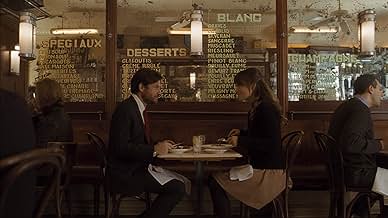Conrad (Jason Bateman) is helped by his old friend Dylan (Billy Crudup) and returns the favor by falling for Dylan's girlfriend Beatrice (Olivia Wilde).Conrad (Jason Bateman) is helped by his old friend Dylan (Billy Crudup) and returns the favor by falling for Dylan's girlfriend Beatrice (Olivia Wilde).Conrad (Jason Bateman) is helped by his old friend Dylan (Billy Crudup) and returns the favor by falling for Dylan's girlfriend Beatrice (Olivia Wilde).
- Awards
- 1 nomination
Seamus Davey-Fitzpatrick
- Young Conrad
- (as Seamus Fitzpatrick)
Nicole Elizabeth Berger
- Young Beatrice
- (as Nicole Berger)
Ann W. Friedman
- Beatrice's Mother
- (as Ann Friedman)
Storyline
Did you know
- TriviaCompleted in 2012, not released until two years later.
- GoofsWhen Conrad presses the recording button on his tape deck and speaks in the microphone, the tape is not rolling. The needles for the volume level don't move either.
- ConnectionsFeatured in Projector: The Longest Week (2014)
- SoundtracksAir on the G string
Taken from 3rd orchestral suite in D major, BWV 1068
Composed by Johann Sebastian Bach
Performed by Jonathan Carney, Royal Philharmonic Orchestra
Featured review
There's nothing wrong, per se, with focusing one's camera and script firmly on the woes and heartaches of the filthy-rich. Indeed, some of the world's most revered film-makers have done so with remarkable success - Woody Allen and Wes Anderson have crafted charming, quirky and emotional films revolving firmly around characters with far too much money and not enough good sense. But creating empathy for hyper-privileged characters is a delicate affair, one that writer-director Peter Glanz - making the move from commercials to movies - more or less fluffs up in The Longest Week. The final film, evidently influenced by Allen, Anderson and copious amounts of offbeat French cinema, struggles to free itself from the quirky artifice that should disguise - and not constitute - the depth of his story and characters.
Conrad Valmont (Jason Bateman) lives a life of leisure and laziness within the comfortable surroundings of a Manhattan hotel belonging to his parents. As a job, he professes to be writing, although he is unlikely to ever complete, his great American novel. His splendid life is rudely disrupted when his parents decide to divorce - and neither father nor mother is willing to keep paying for Conrad's profligate lifestyle. Suddenly, he finds himself out on the street: a situation he temporarily addresses by moving into the swanky apartment belonging to his best friend, Dylan (Billy Crudup). Conrad also winds up making a move on Beatrice (Olivia Wilde), the smart, kooky model who has enjoyed a courtly, mutual flirtation with Dylan for quite some time.
Plot-wise, that's pretty much it. Newly-poor boy meets pretty girl, boy pretends to still be rich, girl falls for it, boy exploits friends (from Dylan to his long-serving, long-suffering butler) to continue his ruse, repeat ad nauseum. It's a narrative that requires considerable skill and sensitivity to pull off, because it could so easily come off as a vapid film glorifying the silly, fickle whims of the rich and fancy. There's no doubt some satire at work here (the title gives a hint as to the length of Conrad's suffering), but it's so blunt that it winds up getting lost in the rest of the film's excesses. In fact, Glanz frequently trades it in for a lot of indie/art-house accoutrements: take, for instance, the way in which it's impossible to quite set a date or time to the film's romanticised version of Manhattan, the almost deliberately French scene in which Conrad and Beatrice dance in a bar in New York, or the Andersonian title cards introducing different segments of the film.
The odd thing is how Glanz both benefits from and wastes his very good cast. On paper, Bateman is perfect for the part of Conrad: he's played a disinherited heir before on TV's Arrested Development, and has bucketloads of personal charm as an actor that could help make Conrad more palatable to audiences. To some extent, that's what Bateman does in practice. The writing keeps him from making Conrad truly sympathetic, but he gets the audience to care a little more when his character meanders into some truly dark places. Even so, it's hard to shake the feeling that - under Glanz's direction - Bateman is miscast. Wilde is charming as the Austen-obsessed Beatrice, but her character really represents little more than a reward for the two men of the story. Crudup, meanwhile, is at his most personable in the film, but Dylan, too, is more an afterthought than a fully-fledged character - both to Conrad and his own creator.
To be perfectly fair, The Longest Week never promises anything like depth. In fact, Glanz makes several pointed comments within the film about Conrad's immutably shallow nature. But, if a film really wants us to accept that its entire plot will do so little to affect its main character (and Conrad does change, albeit in very small ways), the journey has to be worth it. That's where the film falls short. It spends too much time enamoured of its own design and concept. In effect, Glanz transports his characters into a meticulously-crafted, quaintly ageless version of New York, but fails to really make them come to life in a meaningful way.
Conrad Valmont (Jason Bateman) lives a life of leisure and laziness within the comfortable surroundings of a Manhattan hotel belonging to his parents. As a job, he professes to be writing, although he is unlikely to ever complete, his great American novel. His splendid life is rudely disrupted when his parents decide to divorce - and neither father nor mother is willing to keep paying for Conrad's profligate lifestyle. Suddenly, he finds himself out on the street: a situation he temporarily addresses by moving into the swanky apartment belonging to his best friend, Dylan (Billy Crudup). Conrad also winds up making a move on Beatrice (Olivia Wilde), the smart, kooky model who has enjoyed a courtly, mutual flirtation with Dylan for quite some time.
Plot-wise, that's pretty much it. Newly-poor boy meets pretty girl, boy pretends to still be rich, girl falls for it, boy exploits friends (from Dylan to his long-serving, long-suffering butler) to continue his ruse, repeat ad nauseum. It's a narrative that requires considerable skill and sensitivity to pull off, because it could so easily come off as a vapid film glorifying the silly, fickle whims of the rich and fancy. There's no doubt some satire at work here (the title gives a hint as to the length of Conrad's suffering), but it's so blunt that it winds up getting lost in the rest of the film's excesses. In fact, Glanz frequently trades it in for a lot of indie/art-house accoutrements: take, for instance, the way in which it's impossible to quite set a date or time to the film's romanticised version of Manhattan, the almost deliberately French scene in which Conrad and Beatrice dance in a bar in New York, or the Andersonian title cards introducing different segments of the film.
The odd thing is how Glanz both benefits from and wastes his very good cast. On paper, Bateman is perfect for the part of Conrad: he's played a disinherited heir before on TV's Arrested Development, and has bucketloads of personal charm as an actor that could help make Conrad more palatable to audiences. To some extent, that's what Bateman does in practice. The writing keeps him from making Conrad truly sympathetic, but he gets the audience to care a little more when his character meanders into some truly dark places. Even so, it's hard to shake the feeling that - under Glanz's direction - Bateman is miscast. Wilde is charming as the Austen-obsessed Beatrice, but her character really represents little more than a reward for the two men of the story. Crudup, meanwhile, is at his most personable in the film, but Dylan, too, is more an afterthought than a fully-fledged character - both to Conrad and his own creator.
To be perfectly fair, The Longest Week never promises anything like depth. In fact, Glanz makes several pointed comments within the film about Conrad's immutably shallow nature. But, if a film really wants us to accept that its entire plot will do so little to affect its main character (and Conrad does change, albeit in very small ways), the journey has to be worth it. That's where the film falls short. It spends too much time enamoured of its own design and concept. In effect, Glanz transports his characters into a meticulously-crafted, quaintly ageless version of New York, but fails to really make them come to life in a meaningful way.
- shawneofthedead
- Sep 21, 2014
- Permalink
- How long is The Longest Week?Powered by Alexa
Details
Box office
- Gross worldwide
- $46,460
- Runtime1 hour 26 minutes
- Color
Contribute to this page
Suggest an edit or add missing content

